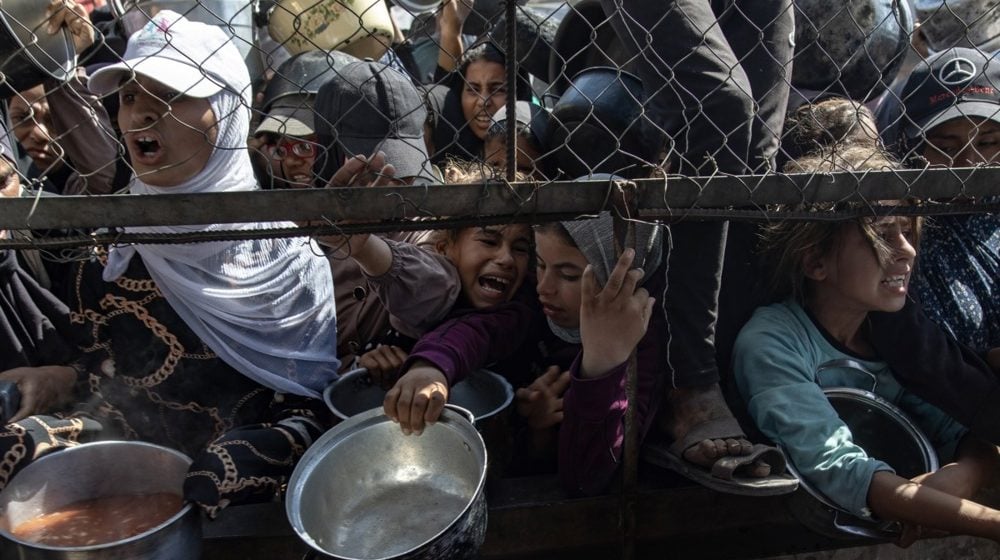
Gaza: Hunger as a Weapon
No one has ever been held individually accountable for starvation as a war crime. But humanitarian horrors, such as those in Gaza or Sudan, are bringing deliberately induced hunger back into the spotlight.
The United Nations has officially declared famine in the city of Gaza, the first such case in the Middle East. Elsewhere, similar examples have already been recorded.
Calls are growing louder to prosecute starvation as a deliberate strategy in armed conflicts.
“Hunger is a weapon of war, used around the world right now. This must stop because it violates international humanitarian law,” said Sheyna Lewis, senior advisor on Sudan at the U.S.-based Prevention and Mass Atrocities organization PAEMA, in an interview with DW.
She was speaking about the city of Al-Fashir in Sudan, under siege for a year. Around 30,000 people there are trapped without food. “That is an international crime and must be prosecuted as such,” said Lewis.
Human rights organizations such as Amnesty International and Human Rights Watch have issued similar statements about Israeli actions in the Gaza Strip: the military is accused of blocking aid and food deliveries, reports Danas.
“Israel is starving Gaza. That is genocide. It is a crime against humanity. It is a war crime,” said Michael Fakhri, UN Special Rapporteur on the right to food, recently in The Guardian.
Starvation as a Weapon of War
There are growing demands for civilian deaths from hunger to be treated as a war crime. One reason is that conflicts are increasingly causing famine.
“Hunger is an ancient practice used by warring parties for centuries,” said Rebecca Bakos Blumenthal, legal advisor at the Dutch foundation GRC’s “Accountability for Starvation” project. Particularly in the past decade, this tactic has been increasingly applied, she said.
In the last ten years, conflict-induced famines have occurred in Nigeria, Somalia, South Sudan, Sudan, Syria, and Yemen. Experts believe Russian attacks on Ukrainian agriculture could legally be characterized as attempts to use food blockades as a weapon of war.
“Although global food security has generally improved, the number of hungry people is rising,” wrote Alex de Waal, professor at Tufts University in the U.S. “Global food security is unevenly distributed. That indicates hunger is being used as a weapon.”
If one party in a conflict deliberately withholds food or other basic supplies from civilians, it is considered a war crime in many states, but also under the Geneva Conventions and the Rome Statute applied by the International Criminal Court.
However, perpetrators who use this “weapon” have never been prosecuted solely for it: the war crime of starvation has never been presented separately before an international court, but only as part of about twenty types of war crimes.
Assessing starvation as a crime is complex: the fact that civilians starve during a conflict does not necessarily mean a crime has been committed.
“One of the key legal issues is the question of intent,” De Waal explained to DW. “The war crime of starvation requires that the perpetrator acted with intent.”
Most legal experts, however, believe there can also be indirect intent—when it is clear that famine could occur, but nothing is done to prevent it.
New Perspectives on Hunger
Until a few years ago, hunger was mostly seen as a developmental or humanitarian problem, says Blumenthal from GRC. Now, more attention is being paid to its criminal dimension. “Things are moving.”
In 2018, the UN Security Council unanimously adopted Resolution 2417, condemning the starvation of civilians as a “method of warfare.” In 2019, the Rome Statute was amended. Since then, starvation has been considered a war crime not only in international but also in internal armed conflicts.
UN investigative commissions on conflicts in South Sudan and Ethiopia were also formed, focusing specifically on starvation as a war crime, Blumenthal notes.
“More and more international and local human rights organizations are condemning this practice. Striking examples, such as the current situation in Gaza, have significantly raised awareness of this crime,” she emphasized.
She believes that the arrest warrants issued by the International Criminal Court against Israeli Prime Minister Benjamin Netanyahu and former Defense Minister Yoav Gallant in November 2024 are a “historic turning point.”
They explicitly include charges of starvation as a war crime. For the first time, international arrest warrants have been issued for alleged starvation as a separate crime.
The International Criminal Court is also investigating in Sudan. Neither Israel, nor the Sudanese regime, nor its opponents recognize the court’s jurisdiction.
The issue of starvation has undoubtedly gained attention in the past decade, says De Waal. “The legal framework exists. What is missing is the political will to act.”
Legal Proceedings Still Uncertain
Legal challenges remain, De Waal told DW. “But I am convinced that convictions are possible. The accused just need to be brought before the court.”
Blumenthal agrees. “There are misconceptions about this, and many people think hunger is an inevitable part of war,” she said. “But our research shows that these patterns are very clear and that in many situations a deliberate strategy can be identified.”
She expresses cautious optimism that those who deliberately starve civilians will one day be held accountable in court. “That is certainly our hope,” she concluded. “That is what we are all working toward.”





